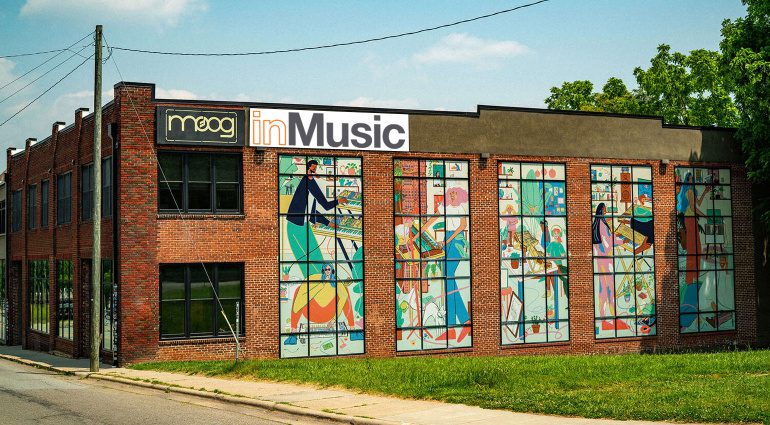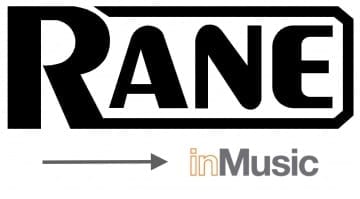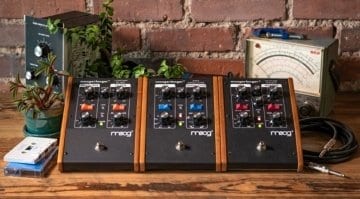Moog Music acquired by InMusic for a new chapter of innovation
In startling news, the usually fiercely independent Moog Music joins the InMusic family to tap into global distribution and brand expertise.
Moog and InMusic
The news comes in a very enthusiastic letter from Moog Music President Joe Richardson addressed to “our friends, artists, partners, collaborators and community”. It talks about how thrilled they are to join a group of talented and like-minded people and how excited they are about forthcoming innovative hardware and software instruments.
Joe says that the future is bright, and InMusic will help them to bolster their efforts and build upon a 70-year legacy.
It’s a very interesting move, not unlike the one Sequential made with Focusrite in 2021. What’s not in the letter is much of the background on why Moog was looking for a partnership. They allude to the ongoing challenges of a small manufacturer, which we can assume is about chip shortages and supply chain issues that have plagued many companies over the last couple of years. Maybe a merger was the only way forward for Moog Music.
InMusic is a mixed bag of brands. Some have faired very well, like Akai Professional and Numark, whereas others, like Alesis and M-Audio seem a long way from their heyday. It’s been a long time since the Alesis A6 Andromeda and there are no other synth brands on the roster. However, I can see how Air Instruments could do great things with Moog licenses for virtual synths, so there is that.
Regardless of my misgivings, Joe says he was very impressed with InMusic’s CEO, Jack O’Donnell and stories of his first synthesizer being a Moog Modular system. Evidently, there’s a shared passion that they believe will honour the values, mission and legacy of Moog Music.
Moog continues
As far as Moog is concerned, product development will continue to be led by long-time Moog engineer Steve Dunnington. The centre of synthesizer magic will remain in Ashville, North Carolina. Also, since 2015 Moog Music has been 49% owned by the employees, so I wonder how this sale affects that relationship.
According to a reply on Instagram the employee arrangement has come to an end:
Our employee ownership was an Employee Stock Ownership Program (ESOP), which is different than a co-op. As part of this transition, Moog Music is no longer employee owned. All eligible employees who have participated in our ESOP since 2015 will receive a payout as a result.
It will certainly be interesting to see what fruits emerge from this partnership. Will it mean cheaper Moog synths, MPCs with ladder filters, or will it just give them a greater reach into new markets? While it doesn’t seem like a natural fit to me, you’ve got to trust that the people on the ground know what they’re doing, and I wish them all the best.
20 responses to “Moog Music acquired by InMusic for a new chapter of innovation”

 3,7 / 5,0 |
3,7 / 5,0 | 







As a long term Moog supporter, I have to say that this announcement is rather troubling. Part of Moog’s charm and appeal has always been its ‘go it alone and be different’ innovative attitude and I believe that this will be lost now that they are part of a larger organisation. The enthusiastic talk of a ‘merger’ is what we would expect to hear from the marketing department but this seems more like a takeover given the respective sizes of the two companies. I wish both companies well for the future and maybe this is the only way that Moog can survive in the current marketplace but I worry that something special has been lost in the process.
The economic developments seem to be stuck in a real dead end. As a small company, you are simply swallowed up too quickly by the big ones. The same goes here, even if Moog figuratively continues to live in the stomach of a locust, it is not the same as it was in freedom before. That is the bitter price of a worldwide globalization that, like an octopus, pulls everything into itself. In the end, there is only convenience food, without an individual touch. I can already say, employees, the wind was already harsh, but now you are all also tied to the chain.
InMusic with the addition of MOOG is now comprised of 20 various brands.
I am not a huge MOOG fan but these large conglomerates gobbling up smaller companies is on trend with what happening globally for better or worse.
Perhaps this merger will lower their already sky-high prices for some of their flagship hardware.
dang, I would not have predicted this! hopefully, it works but my gut reaction was WTF!
Exxactly! Completely agree with every word of yours!
I am in no way a financial specialist, but they could have offered sth like stocks to all customers, fans etc.
They are now part of a portfolio…
is it going against the grain to say that Moog as a company will be better off from this acquisition, as well as the industry?
Not a single employee remains from any of the companies inMusic has ever acquired.
Are you sure about that? I think you are wrong!
dang, if Moog was hurting that bad for money all they needed to do is reissue the minimoog voyager. The CEO just wanted a quick payout and was willing to trash Bob’s legacy to make it happen apparently.
Probably not about quick payouts or MOOG hurting for money. More about MOOG needing better distribution and being able to get better prices and deliveries on components and manufacturing machinery,
I also believe InMusic and MOOG after this merger will go head to head against Behringer, With scaled down cheaper products and also legally…
Behringer shamelessly and blatantly ripping off MOOGs IP will surely not go unpunished..
MOOG not a premium brand? They sure are and they of course makes fantastic sounding instruments some of which are very innovative. MOOG One is probably the ultimate analogue synthesizer ever unfortunately its price is very high but understandably so.
I didn’t see this coming, but I can appreciate how tough it has to be for them to keep going, at least on the same scale as the past 20 years. Anyway, MPCs with Moog filters would be awesome!
Some odd comments in this article. First of all, Alesis has been hugely successful under inMusic’s segment of the market from ADAT and M1’s, but their electronic percussion products are HUGE revenue earners worldwide. Secondly, it was Moog saying they would provide InMusic with the deep analog synth knowledge, not vice versus.
All the brands have been successful but not necessarily for what they were previously famous for. And secondly, you are right, I did read that wrong and I’ve corrected the article, thanks.
All the ‘hate’ doesn’t make sense. inMusic has been on the up the last few years, and they do an impressive job at building on platforms (EngineDJ, MPC, etc.) Moog has been trying to build out products on the Moog One platform (like a successor to the Sub line) to no avail. inMusic, out of all the other brands, seemed to weather the supply chain shortage storm better than most – and this was an area that hit Moog particularly hard.
What we’ll likely see in the near future are products built on the Moog One platform at various price points (just like inMusic has done with the MPC platform and their DJ platforms), the instruments that were mostly made of Chinese parts (Matriarch/Grandmother/Sub line, etc) should go overseas for the complete build, and keep the Asheville location focused on the higher end and reissue pieces.
If Moog had to go this extent, it likely means they were in more trouble than they were letting on. I saw rumors posted that they were struggling to even make payroll. I’m happy that Moog isn’t going away and they are going to a conglomerate that is known for capitalizing on long tail product cycles and have a recent track record of enduring legacy products.
I’m excited for the future of Moog with inMusic. Although if I were involved in those discussions, I would have added Universal Audio as another potential buyer consideration. Focusrite and Roland would been interesting candidates too.
This in bad news at many level… inMusic doesn’t exactly have a great track record of properly nurturing the brands they acquire
Lately, inMusic forced a very annoying authentication system on BFD drums and the forums blew up with angry customers
So this + the loss of independence of another major historical brand is bad news (and yeah it’s a direct consequence of a market shift towards aggressively cheap instruments)
Sad to hear it will no longer be partially employee owned. That’s a major reason why I’ve supported them over other brands.
Horrible news. With the exception of AKAI, every brand in music touches turns to absolute trash.
I’ve read all the comments here. markets cause Companies to take many directions in order to compete in the marketplace to survive. Smaller Companies get gobbled up and what happens next can take many different roads. I have seen things change many times for many Companies. The most significant changes are usually using Brand names to get a bigger market share iInternationally. This generally means building factories where labor is cheaper and the products can be mass marketed at larger profits. Production quality suffers under these conditions. I don’t think employees who at one time took back Fender from CBS wanted to see Stratocasters built in Mexico or Starcasters built in China. When takeovers happen it is always about the almighty dollar. Sometimes the cream rises and quality prevails and sometimes it doesn’t. Fender started the Custom shop around 1986 to continue the production of their higher end guitars. The prices skyrocketed on the American made hand built and factory built guitars and hand wired amps. However the real profits came from the cheaper Mexican produced guitars because they were more affordable and fit in a world marketplace and this enabled more people worldwide to afford them. It is about marketing the Brand not about quality. . So quality was sacrificed for quantity and high quality American built products skyrocketed in price. When Companies move out of the US to produce the product overseas generally the product becomes less expensive and inferior. Look at Levi’s jeans, the good older American made jeans are sought after. I think we will see Moog built items from Asheville rise in price. The secondary market for the original Ashville builds will
increase they always do and Moog will get bigger and a larger market share worldwide and cheaper products will abound. It is no different than other Companies. Take Martin guitars Martin mass produce for lower prices in Mexico and if you go to the big box stores that is mostly what you will see the lower priced cheaper products. They are everywhere all over the world Martin went global by finding cheaper production outside of Nazareth PA a small Company that turned into a giant. Yes there will be speciality stores that handle the higher end Nazareth PA built instruments All these adjustments to the market haven’t hurt the American made products in fact it has increased their value. Martin and Fender and Levi’s certainly are survivors. They are World wide brands.
I would think rather than fret about Moog and the takeover those that really appreciate what has been made in Ashville should be grabbing up what they can before production goes overseas. Even things like the American made semi-Modulars will be better than what is to come. If you were on the fence about some of the more modern production at Ashville don’t be, / you should jump at the opportunity to buy them now before they move to production overseas where the quality can not possibly be the same. This gobbling of Moog should make those who own and supported Moog here realize that they now own a piece of History. In my mind History and quality translate to value. Soon one’s ability to own Ashville made products will be much more difficult as things built in Ashville will skyrocket in price and production overseas will be cheap and not have that Ashville quality. The original Ashville builds will have more value as they were made to higher standards.
InMusic hasn’t done anything yet. Moog is a goner. I’m a few years I can buy it….. what’s left of it
You are currently viewing a placeholder content from Facebook. To access the actual content, click the button below. Please note that doing so will share data with third-party providers.
More InformationYou are currently viewing a placeholder content from Instagram. To access the actual content, click the button below. Please note that doing so will share data with third-party providers.
More InformationYou are currently viewing a placeholder content from X. To access the actual content, click the button below. Please note that doing so will share data with third-party providers.
More Information